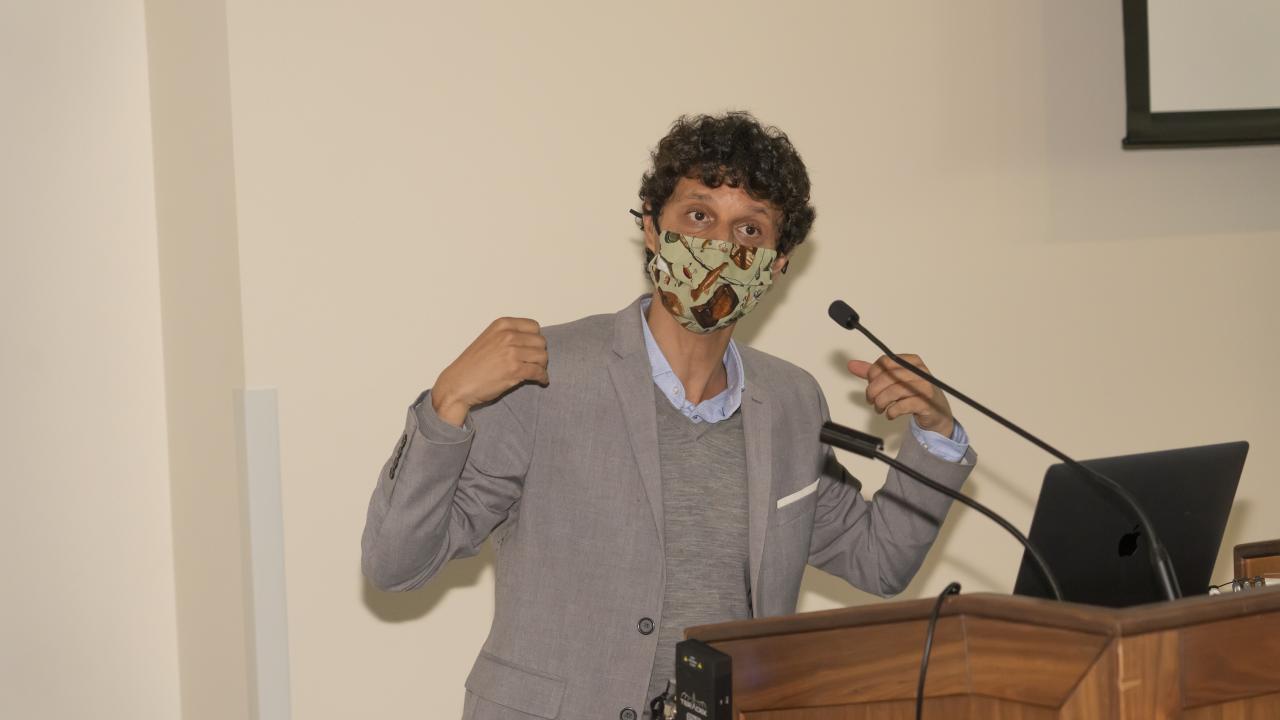
Juan Diego Diaz Music Performances and Book Talk
Africanness in Action: Essentialism and Musical Imaginations of Africa in Brazil
In late February, CAMPSSAH Faculty Scholar Juan Diego Diaz, an Assistant Professor of Music discussed his new book, Africanness in Action: Essentialism and Musical Imaginations of Africa in Brazil.
The event began with two performances featuring music central to Diaz’s research and talents. The first, led by Brian Rice, a lecturer in Music and the Director of Samba and Afro-Cuban Percussion featured Carnival Samba and a group of his student percussionists.
Capoeira's Origins
Capoeira developed in Brazil, derived from traditions brought across the Atlantic Ocean by enslaved Africans and fueled by the burning desire for freedom. It soon became widely practiced on the plantations as a means of breaking the bonds of slavery, both physically and mentally. Read more about this art form: “How Brazilian Capoeira Evolved From a Martial Art to an International Dance Craze” from Smithsonian Magazine.
Following Brian’s Samba Bateria performance, Juan Diego led his own group of students and colleagues in a Brazilian Capoeira performance.
Following these two uplifting musical experiences, Professor Diaz gave a presentation on the inspiration, intellectual traditions, and arguments of his book Africanness in Action: Essentialism and Musical Imaginations of Africa in Brazil.
When many people think of African music, the first ideas that come to mind are often of rhythm, drums, and dancing. These perceptions are rooted in emblematic African and African-derived genres such as West African drumming, funk, salsa, or samba and, more importantly, essentialized notions about Africa which have been fueled over centuries of contact between the "West," Africa, and the African diaspora. These notions, of course, tend to reduce and often portray Africa and the diaspora as primitive, exotic, and monolithic.
Juan Diego takes a more nuanced, historical, and practitioner-minded approach to understanding music in Brazil and Africa. Black musicians from Bahia, a numerically significant destination during the Trans-Atlantic slave trade, Díaz argues, assert Afro-Brazilian identities, promote social change, and critique racial inequality by creatively engaging essentialized tropes about African music and culture. Instead of reproducing these notions, musicians demonstrate agency by strategically emphasizing or downplaying them.
Diaz walked the audience through the complexity of the characteristics that are often associated with African music–Rhythmicity, Percussiveness, Spontaneity, Collectivism, to name a few–and how the converse of many of them–Melodicity, Formalism, Individualism, for example–can actually be found in the music he examines, much to the contrary of common expectations.
We invite you to watch the recording of the musical performances and his talk in the video below. You can also view a PDF of the presentation slides Professor Diaz shared with the audience. Additionally, below the video you can find linked several examples of the music Juan Diego used as examples in his presentation.
Please note the video of the musical performances goes to full screen at minute 14.
